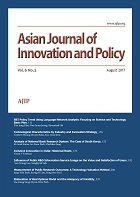Entrepreneur in Academic Research:Interview with Professor Kwang-Hyung Lee
Sanghyuk Suh (Hoseo University)
Abstract
This is an interview with Professor Kwang-Hyung Lee, founding Dean of KAIST Moon Soul Graduates School of Future Strategy and founder of the Department of Bio and Brain Engineering of the same university casting two questions about academics. The first question is what pattern is desirable in the evolution of research topics of an academics. While traditional researchers in science and engineering tend to focus on one subject in ever greater depth over time, Professor Lee’s research agenda has spanned several new topics by gradually changing the content of the study: from artificial intelligence to bio and brain research, and to creativity development method, further to future study. The second question is about researchers’ social responsibility. He has devoted to contributes to industry fields and the nation through academic activities as well as educating several successful business people, founding a new academic department and graduate school of future studies.
- keywords
- Academic entrepreneur, artificial intelligence, creativity development, social responsibility, future study
참고문헌
James C. K., Robert J.S. (eds.) (2006), The International Handbook of Creativity, Cambridge University Press.
KAIST Moon Soul Graduate School of Future Strategy (2014), Korean National Future Strategy 2015, Paju: Icon Publishing, Korea. (in Korean)
KAIST Moon Soul Graduate School of Future Strategy (2015), Korean National Future Strategy 2016, Paju: Icon Publishing, Korea. (in Korean)
KAIST Moon Soul Graduate School of Future Strategy (2016), Korean National Future Strategy 2017, Paju: Icon Publishing, Korea. (in Korean)
Lee, K.H. (1993), Future by Science and Technology, Ministry of Culture and Tourism. (in Korean)
Lee, K.H. (1995), If I have Computer Company like POSCO, Seoul: Sol Publishing. (in Korean)
Lee, K.H. (1996), From Multimedia to Cyberspace, Seoul: Sol Publishing. (in Korean)
Lee, K.H. (1997), Introduction to System Programming, Prentice Hall.
Lee, K.H. (1997), Startup Company - I Can Do, Seoul: DongA Ilbo. (in Korean)
Lee, K.H. (2000), The 21st Strong Startup Nation, Seoul: Kimyoungsa. (in Korean)
Lee, K.H. (2004), First Course on Fuzzy Theory and Application, Springer.
Lee, K.H. (2012), Developing Three Dimensional Creativity of Professor Kwang-Hyung Lee, Seoul: Business Map. (in Korean)
Lee, K.H. (2012), Developing Three Dimensional Creativity, Seoul: Business Map.2012. (in Korean)
Lee, K.H. (2012), Future Management by Three Dimensional Forecast, Seoul: Sangneung. (in Korean)
Lee, K.H. (2014), Three Dimensional Creativity, Springer. (Who put creativity in my brain? Munhakdongne, 2015, Korean ed.)
Lee, S.W. (2015), KAIST shows startup power - KAIST startups’ sales reaches over 10 trillion Korean Won, Wooritvnews, 2015-07-08. (in Korean)http://www.wooritvnews.com/news/articleView.html?idxno=77181
Cohen, M.V. (1967), Creativity Training and Personality Change, University of Wisconsin-Madison.
Vartanian, O., Bristol, A.S. and Kaufman, J.C. (eds.) (2013), Neuroscience of Creativity, MIT Press.
Kieth, S.R. (2012), Explaining Creativity: The Science of Human Innovation (2nd ed.), Oxford University Press.
Seol, S.S., Park, J.M. and Suh, S.H, (2002), The Origin and Formation of Daedeok Valley, Seoul, Science and Technology Policy & Evaluation Institute. (in Korean)
Shim, J.Y., (2014), Why Moon Soul Chung entrust 51.5 billion Korean Won to Kwang-Hyung Lee? New Daily, 2014.1.26. (in Korean) newdaily.co.kr/mobile/mnewdaily/tk_newsview.php?id=189106
- 다운로드 수
- 조회수
- 0KCI 피인용수
- 0WOS 피인용수


